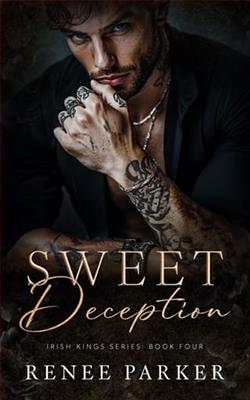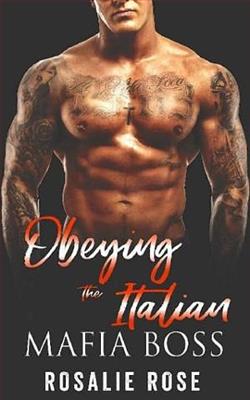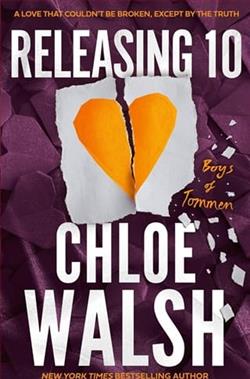Page 41 of Last Hand
The twins are picking flowers once again, comparing colors, completely oblivious to the current of pain flowing between their mother and me. Their innocence is a luxury Rebecca ensured for them and denied to me.
I watch them for a moment, these girls who have the mother I needed and never got. The ache in my chest is physical,a hollow space where something vital should be. I wonder if Rebecca feels it, too—this gulf between us, this broken thing that can never be made whole.
Rebecca reaches out instinctively like she wants to touch my arm. I pull back sharply. The movement sends a jolt of pain through my bruised ribs, and I welcome it. Physical pain is simpler, cleaner than this emotional morass.
“Don’t,” I warn, my voice low. “Don’t you dare try to be soft with me. You don’t get to be the mother to them that I needed.”
Her hand falls back to her lap, defeated. “I didn’t choose this life,” she whispers, her voice barely audible above the breeze rustling through the grass. “I just… survived.”
The simplicity of her response lights a fire in my chest, anger flaring hot and immediate. She makes it sound like she had no agency, no choice in any of it. As if abandoning us was as inevitable as the tide.
“No,” I say, the word sharp enough to cut glass. “You got clean. You learned how to be a mother. You chose when to start trying.” I gesture toward the twins. “And you waited until we were old enough not to matter anymore.”
Rebecca flinches as if I’ve slapped her. For a moment, I glimpse the woman beneath the careful maternal performance, worn, watchful, carrying something heavy that never fully leaves her.
“You should rest; you need to save your strength,” she says after a long pause, nodding toward a nearby bench in the shade. The abrupt shift in conversation throws me momentarily. I move toward it slowly. Rebecca follows at a distance, respecting the invisible boundary I’ve drawn between us. From here, I can see Igor on the porch, still watching with predatory patience. His eyes track our movement, alert for any sign of trouble.
“Does he always follow you everywhere?” I ask, nodding slightly toward our captor as I sink onto the bench.
Rebecca sits at the opposite end, leaving plenty of space between us. “Yes,” she answers simply. “Always.”
She glances toward Igor, then back at me, her voice dropping even lower. “I managed to get a message to your father.”
The statement is so unexpected that for a moment, I can’t process it. “What?”
“I managed to get Mikhail’s phone,” she repeats, her eyes holding mine with sudden intensity. “When the time comes, you need to run.”
A harsh laugh escapes me before I can stop it. “Run where? We’re in the middle of nowhere.” I gesture at the mountains visible in the distance, the dense forest surrounding the property. “There’s nothing but trees for miles.”
Rebecca doesn’t respond directly, just watches the twins as they abandon their flower collection and race toward the play structure. “Who wants to go on the swings?” she calls out, her voice transformed into the cheerful mother-tone she uses with them.
The twins shriek with delight, rushing toward the swing set at the far end of the yard. Rebecca stands, then turns to me with an expectant look. “Coming?”
I remain seated for a moment, trying to make sense of what she just told me. A message to Dad? It sounds like desperate fantasy, not a real plan. Yet something in her expression, a focused intensity beneath the maternal softness makes me hesitate to dismiss it entirely.
I rise slowly, following her toward the swings where the twins are already scrambling to claim their favorite seats. Igor watches our procession across the lawn, then heaves himself up from his chair. He follows at a distance, positioning himself under a tree where he can observe the entire play area.
“Push me, Mama!” Anya demands, while Mila is already pumping her legs, determined to swing independently.
Rebecca obliges, stepping behind Anya’s swing. She gives a gentle push, then another, establishing a rhythm. “Fallon, would you like to help Mila?” she asks, her voice deliberately casual.
I hesitate, then move to the other swing. Mila gazes up at me with curious eyes—Emma’s eyes, almost—and my chest tightens. I place my hands on the chains, giving a tentative push. The little girl giggles, delighted by the extra height.
“Higher!” she requests, and I comply automatically, falling into the familiar motion of push and release.
Rebecca watches me interact with Mila, something complicated happening behind her eyes. “Look at the valley below,” she says quietly, nodding toward the forest beyond the property.
I follow her gaze, noticing for the first time that from this elevation, we can see over the treeline to a small town nestled in the valley. Houses are scattered throughout the forest, tiny squares of civilization in the wilderness. Not as isolated as I’d thought, then. The realization sends a jolt of something like hope through me, quickly tempered by the reality of our situation.
“It’s about three miles,” Rebecca says conversationally, as if discussing the weather. “Down the mountain road, you’ll recognize your surroundings once you reach the road.”
I push Mila’s swing again, processing this information. Is she actually suggesting an escape route? After telling me she’s contacted Dad? It seems too convenient, too hopeful.
“Why are you telling me this?” I ask, keeping my voice neutral as I push the swing again.
Rebecca’s eyes meet mine over the swings, over the heads of the daughters she didn’t abandon. “I know,” she says simply. “I’m trying to make sure you don’t die here. You need to get to the road.”
The twins laugh, oblivious to the weight of our conversation, to the years of pain suspended between their mother and me.Their joy feels alien, from another universe where mothers are reliable and safety is a given.















